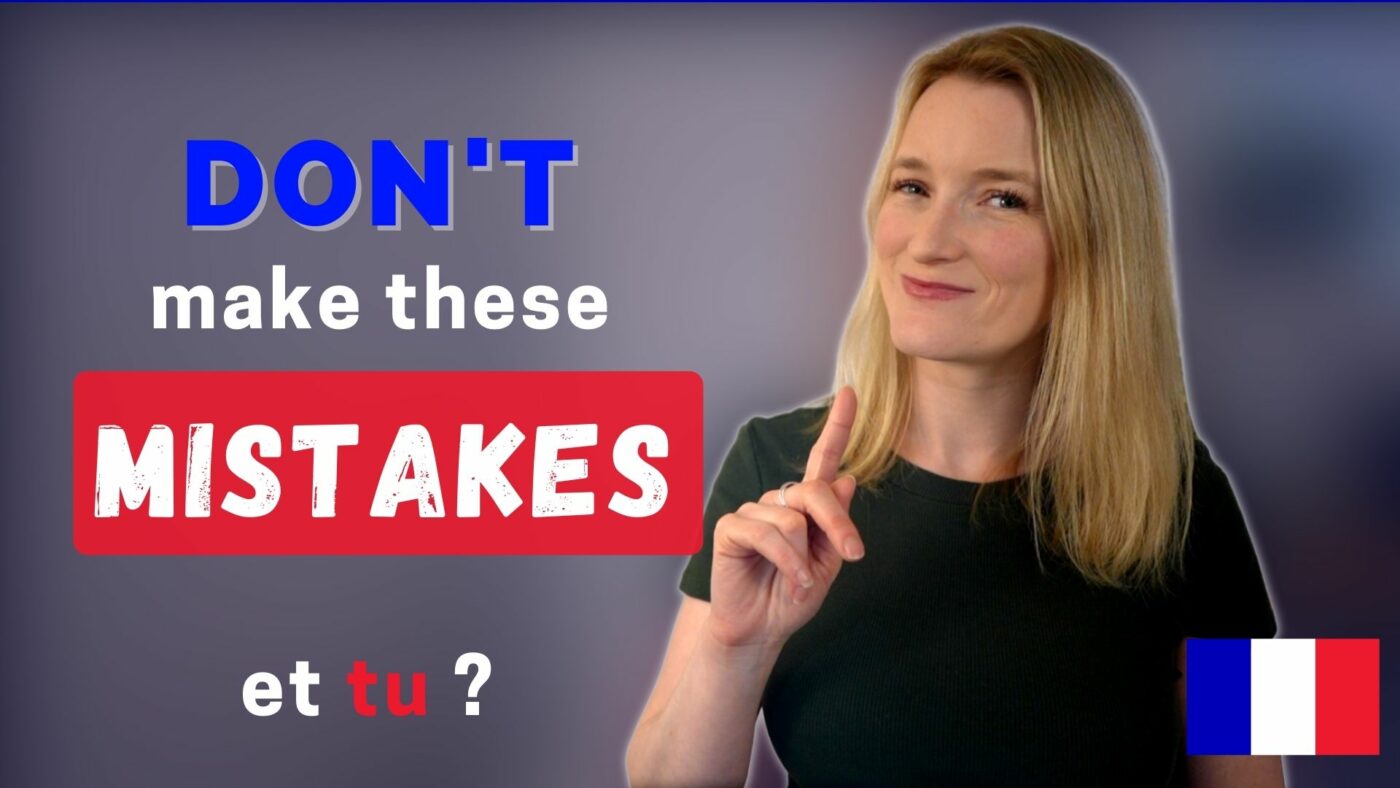Menu
Close
Mistakes are a part of learning a new language. They are important! I myself made quite a few when I was learning English, and I still make some. However, some mistakes can be avoided. In this lesson, I share with you 15 French mistakes I hear students make all the time and that can be avoided in 2023.
There is a mix of:
– French pronunciation
– French grammar
– French conjugation
– Choice of words (False friends)
Free PDF at the bottom of the page 📄

Ça va et tu ? is probably one of the most common French mistakes I have heard of the year. It’s simply the wrong pronoun but the mistakes is easily understood for English speakers.
In English “I am good and you?” – You, even tho it’s an emphatic pronoun, doesn’t change from the subject pronoun “you.” In French, they are different.
In French, this pronoun is called Un pronom tonique. Let’s review them and see a couple of situations where we use them.
moi – me
toi – you
lui – him
elle – her
nous – us
vous – you
eux – them (m)
elles – them (f)
Emphatic pronouns in French have many uses but here are three of the most common ones:
After et – and
Ça va et toi ? I am good and you?
After pour – for
C’est pour toi. It’s for you.
After avec – with
Je veux venir avec toi. I want to come with you.
This is an honest mistake but in French, we don’t pronounce the last letter of the word (most of the time), especially when this one is a consonant.
For example the adjective Green : vert, we only pronounce the T when we have the super E at the end: Vert – Verte
Think of the final E as the super hero of the French language. The final E gives its power to the consonant before to be pronounced, but E, as a good super hero working in the background, isn’t pronounced at all.
False friends are extremely common. How has never try a word from their own language with a French accent just to see if it’s going to work?
I did! It doesn’t always work and it can lead to quite a few embarrassing mistakes!
The list of false friends between French and English is quite long. I will make a new blog post about it soon, but here are a few:
Attendre vs To attend
To wait – Assister
Librairie vs Library
A bookstore – Une bibliothèque
Blessé vs Blessed
Injured – Béni(e)
I may have to make a longer post on this one but Rencontrer in French is used when you meet someone for the first time – Retrouver is used when you meet someone and you have plans with them.
J’ai rencontré mes beaux-parents le week-end dernier.
I met my in-laws last weekend.
J’ai retrouvé mes beaux-parents au centre commercial.
I met my in-laws at the mall.
I know, I know. This one is hard to overcome when learning French because there is a lot to learn but remember that the imparfait is for the background, passé composé is for a precise event.
Je regardais la télévision quand le téléphone a sonné.
I was watching TV when the phone rang.
Je regardais la télévision quand le téléphone sonnait.
I was watching TV while the phone was ringing.
This one means the phone rang the whole time you were watching TV. Quite uncomfortable, isn’t it?
You can watch this video if you need to more about the imparfait vs passé composé.
This one is also a false friend but I always find it important to make a separate point about it because Je suis excité(e), in French, doesn’t mean what you think it s. And it can be quite embarrassing!
Je suis excité(e) means that you are aroused. Not that you are excited.
To be excited is Avoir hâte – Être impatient(e)
This mistake comes from translating sentences word by word from English to French. Been there, done that!
In French, we use Avoir instead of Être for sensation and feelings:
J’ai froid – I am cold
J’ai chaud – I am hot
J’ai faim – I am hungry
J’ai soif – I am thirsty
J’ai peur – I am afraid
J’ai mal – To be in pain
If you are familiar with French conjugation, you probably know that verbs are usually conjugated with the auxiliary Avoir for compound tenses. A compound tense is when the conjugation has two different verbs.
A short list of verbs in French take Être and not Avoir when conjugated in compound tenses such as passé composé. Let’s see them again.
Use the acronyms DR & MRS VANDERTRAMPP to remember them:
Devenir – To become
– Je suis devenu(e) – I became
Revenir – To come back
– Tu es revenu(e) – You came back
&
Monter – To go up
– Il est monté – He went up
Rester – To stay
– Elle est restée – She stayed
Sortir – To go out
– On est sorti(e.s) – We went out
Venir – To come
– Nous sommes venu(e)s – We came
Aller – To go
– Vous êtes allé(e)s – You went
Naître – To be born
– Ils sont nés – They were born
Descendre – To go down
– Elles sont descendues – They went down
Entrer – To enter
– Je suis entré(e) – I entered
Rentrer – To go home
– Tu es rentré(e) – You went home
Tomber – To fall
– Il est tombé – He fell
Retourner – To return
– Elle est retournée – She returned
Arriver – To arrive
– On est arrivé(e)s – We arrived
Mourir – To die
– Vous êtes mort(e)s – You died
Partir – To leave
– Ils sont partis – They left
Passer – To pass by
– Elles sont passées – They passed by
If you use visiter for people, it sounds like you will visit their inside.
They both mean To know, I know I know.
But remember that Savoir translates to To know how to do something and is often followed by a verb.
Je sais parler français.
I know how to speak French.
Je connais cette chanson.
I know this song.
Actually, I could add c’est chaud as well. Those are for temperatures, yes but for food, drinks, and sensations, not for the weather.
Il fait chaud.
It’s hot.
Il fait froid.
It’s cold.
But:
C’est chaud.
It’s hot. (café – nourriture – touché)
Pas is the second part of the negation in French (ne … pas). In a negative sentence, the article des becomes de – not matter what.
Pas des doesn’t exist in French, it’s only pas de. It can also be pas d’ when followed by a vowel or a silent H.
J’ai des gâteaux.
I have cakes.
Je n’ai pas de gâteaux.
I don’t have cakes.
J’ai des idées.
I have ideas.
Je n’ai pas d’idées.
I don’t have ideas.
In French, we use a lot of contractions, just like in English. Not using them is a grammar mistakes but it also makes sounds unnatural. Contractions are made for the language to be easy to pronounce.
One of the common contractions are Le & LA becoming L’ when followed by a vowel or a silent H.
Le ami = l’ami – the friend
La eau = l’eau – the water
Mispronouncing U and OU is usually pretty innocent.
If you say J’ai pu (I was able to) – J’ai pou – it sounds like you say that you have lice.
Obviously, in the sentence, everyone is going to understand that you don’t have lice.
The one that can be a little misunderstood is beaucoup (a lot) – if you say BEAUCU – That means Beau Cul – beautiful butt.
Awkward!
Do you want to learn French but you don’t know where to start?
Get my self-study guide and just follow the lesson!
If you prefer to watch a video lesson, you can watch this video.
